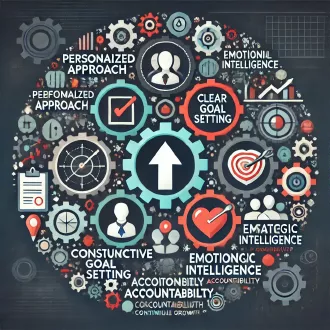Transcription Difference between traditional management and management with leadership coaching
The difference between traditional management and leadership coaching management is profound and has a significant impact on culture, performance and development within an organization. Adopting a coaching approach to management transforms the way leaders relate to their teams and how they approach challenges.
Moving from a traditional management style to the new styles where coaching is included, several benefits can be seen. Among these are:
- Increased profits.
- Increased productivity.
- Improved customer service.
- Improved interpersonal relationships.
- Decrease in conflicts.
- Improvement in the functioning and performance of work teams.
- Increased employee satisfaction and sense of belonging.
Here we explore the key differences between traditional management and management with leadership coaching:
Traditional Management:
- One-way communication: in traditional management, communication tends to be one-way, with leaders giving instructions and expecting compliance.
- Control and micromanagement: leaders in traditional management tend to have a greater degree of control and may be more inclined to micromanage tasks and decisions.
- Focus on authority: authority and hierarchy are central to traditional management, and leaders rely on their position to make decisions.
- Task focus: the focus is on tasks and end results, with less emphasis on the personal and professional development of employees.
- Imposed solutions: in traditional management, leaders often impose solutions to problems without involving employees much in the decision-making process.
Management with Leadership Coaching:
- Two-way communication: in management with leadership coaching, communication is two-way, encouraging open dialogue and constant feedback between leaders and employees.
- Empowerment and delegation: leaders adopt an empowering approach, trusting their teams and delegating responsibilities to promote growth and autonomy.
- Development and mentoring: leaders in this modality act as mentors and facilitators of their employees' growth, fostering their development through guidance and coaching.
- Focus on personal and professional development: the focus shifts to the integral development of employees, seeking to maximize their potential and skills.
- Collaborative solutions: in leadership coaching management, leaders work with employees to find collaborative solutions to challenges, actively involving them in the process and leveraging their perspectives and knowledge.
management traditional




